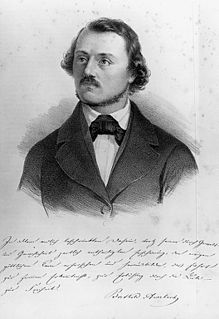
Alexander III was the Emperor of Russia, King of Poland, and Grand Duke of Finland from 13 March [O.S. 1 March] 1881 until his death on 1 November [O.S. 20 October] 1894. He was highly conservative and reversed some of the liberal reforms of his father, Alexander II. During Alexander's reign Russia fought no major wars, and he was therefore styled "The Peacemaker".
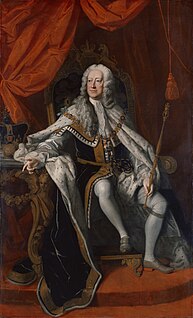
George II was King of Great Britain and Ireland, Duke of Brunswick-Lüneburg (Hanover) and a prince-elector of the Holy Roman Empire from 11 June 1727 (O.S.) until his death in 1760.

Caroline of Brandenburg-Ansbach was Queen of Great Britain as the wife of King George II.

Friedrich Dürrenmatt was a Swiss author and dramatist. He was a proponent of epic theatre whose plays reflected the recent experiences of World War II. The politically active author's work included avant-garde dramas, philosophical crime novels, and macabre satire. Dürrenmatt was a member of the Gruppe Olten.

Charlotte of Mecklenburg-Strelitz was the wife of King George III. She served as Queen of Great Britain and Queen of Ireland from her wedding in 1761 until the union of the two kingdoms in 1801, after which she was Queen of the United Kingdom of Great Britain and Ireland until her death in 1818. She was also the Electress of Hanover in the Holy Roman Empire until the promotion of her husband to King of Hanover on 12 October 1814, after which she was also queen consort of Hanover.
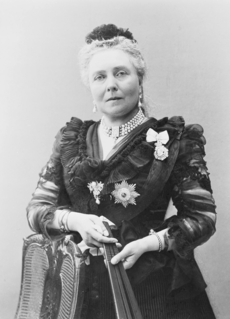
Victoria, Princess Royal was German Empress and Queen of Prussia by marriage to German Emperor Frederick III. She was the eldest child of Queen Victoria of the United Kingdom and Prince Albert of Saxe-Coburg and Gotha, and was created Princess Royal in 1841. She was the mother of Wilhelm II, German Emperor.

Louisa Ulrika of Prussia was Queen of Sweden between 1751 and 1771 by her marriage to King Adolf Frederick, and queen mother during the reign of King Gustav III.

Gustaf Gründgens, born Gustav Heinrich Arnold Gründgens, was one of Germany's most famous and influential actors of the 20th century, and artistic director of theatres in Berlin, Düsseldorf, and Hamburg. His career continued unimpeded through the years of the Nazi regime; the extent to which this can be considered as deliberate collaboration with the Nazis is hotly disputed.

Princess Elisabeth Charlotte was a German princess and, as Madame, the second wife of Philippe I, Duke of Orléans, younger brother of Louis XIV of France, and mother of France's ruler during the Regency. Louis invoked her hereditary claim to the Palatinate as pretext to launch the Nine Years' War in 1688. Her vast, frank correspondence provides a detailed account of the personalities and activities at the court of her brother-in-law, Louis XIV, for half a century, from the date of her marriage in 1672.

Sophia Magdalena of Denmark was Queen of Sweden as the spouse of King Gustav III.

Louise of Hesse-Kassel was Queen of Denmark by marriage to King Christian IX of Denmark.

Sophie Amalie of Brunswick-Lüneburg was queen of Denmark and Norway as the consort of the King Frederick III of Denmark. She is known for her political influence, as well as for her cultural impact: she acted as the adviser of Frederick III, and introduced ballet and opera to Denmark.

"Der Hölle Rache kocht in meinem Herzen", commonly abbreviated "Der Hölle Rache", is an aria sung by the Queen of the Night, a coloratura soprano part, in the second act of Mozart's opera The Magic Flute. It depicts a fit of vengeful rage in which the Queen of the Night places a knife into the hand of her daughter Pamina and exhorts her to assassinate Sarastro, the Queen's rival, else she will disown and curse Pamina.

The Boleyn Inheritance is a novel by British author Philippa Gregory which was first published in 2006. It is a direct sequel to her previous novel The Other Boleyn Girl, and one of the additions to her six-part series on the Tudor royals. * The novel is told through the first-person narratives of – Anne of Cleves, Katherine Howard, and Jane Boleyn, who was mentioned in The Other Boleyn Girl. It covers a period from 1539 until 1542 and chronicles the fourth and fifth marriages of King Henry VIII of England.
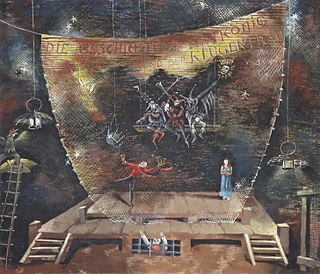
Die Kluge. Die Geschichte von dem König und der klugen Frau is an opera in 12 scenes written by Carl Orff. It premiered in Frankfurt, Germany, on 20 February 1943. Orff referred to this opera as a Märchenoper. The composer also wrote the libretto, based on Die Kluge Bauerntochter from the Grimm's Fairy Tales. A performance lasts for about 90 minutes and is often paired with Orff's Der Mond.
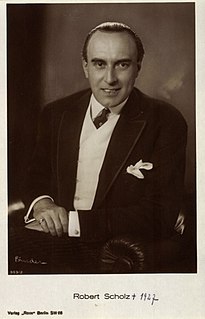
Robert Scholz was a German film actor of the silent era. He appeared in 76 films between 1919 and 1928. He was born in Germany and died in Berlin.

3 Musketiers is a Dutch musical, also known as 3 Musketiere (German), 3 Musketeers (English) and A 3 Testőr (Hungarian) written by Ferdi Bolland and Rob Bolland. The story is based on Alexandre Dumas, père's novel The Three Musketeers. It premiered in Rotterdam in 2003 starring Bastiaan Ragas as d'Artagnan and Pia Douwes as Milady de Winter.

The United Kingdom does not have a codified constitution such as other countries tend to have. Instead of such a constitution, certain documents stand to serve as replacements in lieu of one. These texts and their provisions therein are considered to be constitutional, such that the "constitution of the United Kingdom" or "British constitution" may refer to a number of historical and momentous laws and principles like the Acts of Union 1707 and the Acts of Union 1800 which formulate the country's body politic. Thus the term "UK constitution" is sometimes said to refer to an "unwritten" or uncodified constitution. The British constitution primarily draws from four sources: statute law, common law, parliamentary conventions, and works of authority. Similar to a constitutional document, it also concerns both the relationship between the individual and the state and the functioning of the legislature, the executive, and the judiciary.

Philip the Contentious, a member of the Wittelsbach dynasty, was a titular Count Palatine of the Rhine and ruling Duke of Palatinate-Neuburg from 1505 to 1541.

